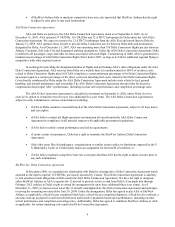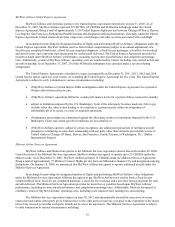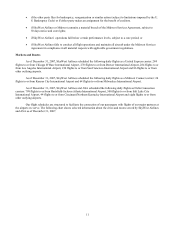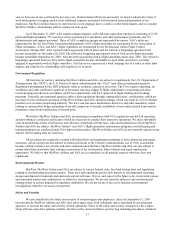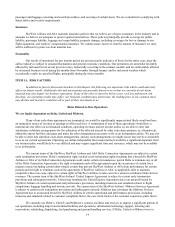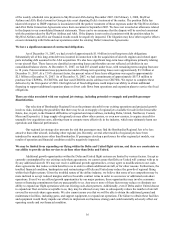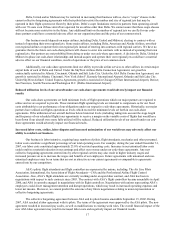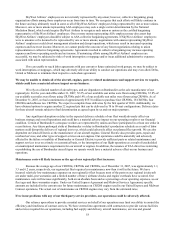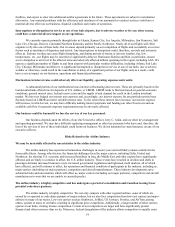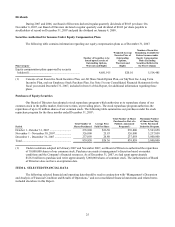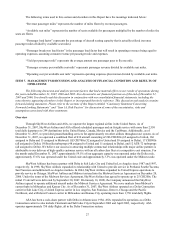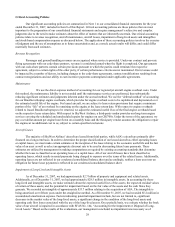SkyWest Airlines 2007 Annual Report Download - page 20
Download and view the complete annual report
Please find page 20 of the 2007 SkyWest Airlines annual report below. You can navigate through the pages in the report by either clicking on the pages listed below, or by using the keyword search tool below to find specific information within the annual report.19
facilities, and expect to enter into additional similar agreements in the future. These agreements are subject to termination
after notice. Any material problems with the efficiency and timeliness of our automated or contract services could have a
material adverse effect on our business, financial condition and results of operations.
Interruptions or disruptions in service at one of our hub airports, due to adverse weather or for any other reason,
could have a material adverse impact on our operations.
We currently operate primarily through hubs in Atlanta, Kansas City, Los Angeles, Milwaukee, San Francisco, Salt
Lake City, Chicago, Denver, Cincinnati/Northern Kentucky and the Pacific Northwest. Nearly all of our flights will either
originate or fly into one of these hubs. Our revenues depend primarily on our completion of flights and secondarily on service
factors such as timeliness of departure and arrival. Any interruptions or disruptions could, therefore, severely and adversely
affect us. Extreme weather can cause flight disruptions, and during periods of storms or adverse weather, fog, low
temperatures, etc., our flights may be canceled or significantly delayed. Hurricanes Katrina and Rita, in particular, caused
severe disruption to air travel in the affected areas and adversely affected airlines operating in the region, including ASA. We
operate a significant number of flights to and from airports with particular weather difficulties, including Atlanta, Salt Lake
City, Chicago, Milwaukee and Denver. A significant interruption or disruption in service at one of our hubs, due to adverse
weather or otherwise, could result in the cancellation or delay of a significant portion of our flights and, as a result, could
have a severe impact on our business, operations and financial performance.
Fluctuations in interest rates could adversely affect our liquidity, operating expenses and results.
A substantial portion of our indebtedness bears interest at fluctuating interest rates. These are primarily based on the
London interbank offered rate for deposits of U.S. dollars, or LIBOR. LIBOR tends to fluctuate based on general economic
conditions, general interest rates, federal reserve rates and the supply of and demand for credit in the London interbank
market. We have not hedged our interest rate exposure and, accordingly, our interest expense for any particular period may
fluctuate based on LIBOR and other variable interest rates. To the extent these interest rates increase, our interest expense
will increase, in which event, we may have difficulty making interest payments and funding our other fixed costs and our
available cash flow for general corporate requirements may be adversely affected.
Our business could be harmed if we lose the services of our key personnel.
Our business depends upon the efforts of our chief executive officer, Jerry C. Atkin, and our other key management
and operating personnel. We may have difficulty replacing management or other key personnel who leave and, therefore, the
loss of the services of any of these individuals could harm our business. We do not maintain key-man insurance on any of our
executive officers.
Risks Related to the Airline Industry
We may be materially affected by uncertainties in the airline industry.
The airline industry has experienced tremendous challenges in recent years and will likely remain volatile for the
foreseeable future. Among other factors, the financial challenges faced by major carriers, including Delta, United and
Northwest, the slowing U.S. economy and increased hostilities in Iraq, the Middle East and other regions have significantly
affected, and are likely to continue to affect, the U.S. airline industry. These events have resulted in declines and shifts in
passenger demand, increased insurance costs, increased government regulations and tightened credit markets, all of which
have affected, and will continue to affect, the operations and financial condition of participants in the industry, including us,
major carriers (including our major partners), competitors and aircraft manufacturers. These industry developments raise
substantial risks and uncertainties which will affect us, major carriers (including our major partners), competitors and aircraft
manufacturers in ways that we are unable to currently predict.
The airline industry is highly competitive and has undergone a period of consolidation and transition leaving fewer
potential code-share partners.
The airline industry is highly competitive. We not only compete with other regional airlines, some of which are
owned by or operated as code-share partners of major airlines, but we also face competition from low-cost carriers and major
airlines on many of our routes. Low-cost carriers such as Southwest, JetBlue, US Airways, Frontier, and AirTran, among
others, operate at many of our hubs, resulting in significant price competition. Additionally, a large number of other carriers
operate at our hubs, creating intense competition. Certain of our competitors are larger and have significantly greater
financial and other resources than we do. Moreover, federal deregulation of the industry allows competitors to rapidly enter


